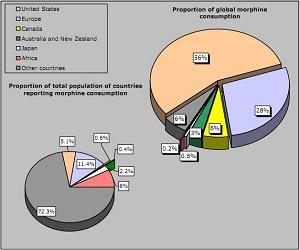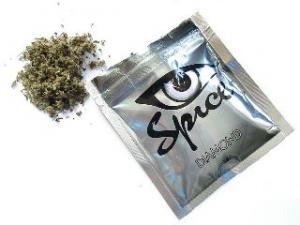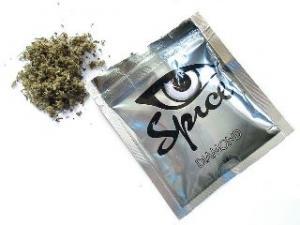Marijuana decriminalization has become a hot topic in state legislatures, and legalization is rearing its head, too.
While the US wallows in a sea of pain pills, much of the rest of the world goes without, the International Narcotics Control Board reported Wednesday. Not to be too liberal, the INCB is also worried about the rise of designer drugs.
The biennial International Drug Policy Reform Conference will convene this fall in Los Angeles. Session proposals are accepted until March 18, and registration and scholarship applications for the conference will open soon.
Synthetic marijuana has been banned by the DEA in an emergency action. This time, they mean it.
The fake pot menace has been eliminated from Nebraska, or at least, driven underground.
A bill that would create medical marijuana dispensaries in Hawaii won a key Senate committee vote Thursday.
Utah is the latest state to hop on the fake pot ban bandwagon. The same law also bans mephedrone.
Michigan gives us two spectacularly egregious cases of corrupt policing, one of which included prosecutors and a judge -- and we throw in the obligatory greedy jail guards.
Copenhagen is set to become the next European city with a safe injection site -- except the police don't want anyone to actually inject drugs there. A confrontation looms.
A take-down of alleged crack dealers in a Lackawanna, New York, gas station parking lot has yielded the year's 11th drug war fatality.
A traffic stop as part of a drug investigation turned deadly in Fort Worth Monday night. Police blame the suspect, but locals want an investigation.
Events and quotes of note from this week's drug policy events of years past.
Times are changing. Ten states decriminalized the possession of marijuana in a sudden burst in the 1970s, just before the dark, "just say no" years of the Reagan era, but after that, it was more than two decades before another state decriminalized when Nevada joined the list in 2001. Then Massachusetts voters added the Bay State to the list in 2008, and California came on board last year.

California Rep. Ammiano during legislative hearings on his legalization bill, January 2010, Sacramento
Driven by budgetary imperatives and increasing awareness of the absurdity of pot prohibition, what had been a trickle of interest in at the least down-grading the severity of pot punishments now threatens to become a torrent. At least nine state legislatures are contemplating marijuana decriminalization bills this year (a tenth, Virginia's, already defeated it this year), while California is pondering a bill to reduce cultivation penalties, and legislatures in two states, Massachusetts and Washington, are considering outright legalization.
It's unlikely that all -- or even most -- of the bills will pass, but prospects are good in several states. In other states, progress will be measured by winning a hearing or a committee vote, and will be viewed as laying the ground work for a longer-term legislative strategy.
"That these bills are popping up shows that popular support has been increasing for both taxing and regulating marijuana and other reforms," said Karen O'Keefe, director of state affairs for the
Marijuana Policy Project (MPP). "Gallup and other polls show steady increases in support," she added.
"States are also interested in decriminalization because of their budget crunches," O'Keefe noted. "They can't afford to lock up people for marijuana possession. There has been an explosion in these bills. The states can do this to save money and not punish people so severely for something that is less harmful than alcohol."
Here are the states where decriminalization bills have been introduced (thanks to
NORML and its
"Take Action" web page):
In
Arizona,
House Bill 2228 would make adult possession of up to two ounces a petty offense punishable by a $100 fine. Under current law, possession of that amount is potentially a felony. The bill has been referred to the House Rules Committee, where no action has been taken.
In
California, Rep. Tom Ammiano (D-San Francisco) is not reintroducing his legalization bill, but has introduced
Assembly Bill 1017, which would keep marijuana growers out of prison by reducing the offense from a felony to a misdemeanor. It is not exactly decriminalization of cultivation, but it is a step in that direction.
In
Connecticut, Gov. Dan Malloy (D) is backing
Senate Bill 163, which decriminalizes adult possession of up to an ounce, making it a civil infraction punishable only by a fine. Currently, possession is a misdemeanor worth up to a year in jail and a $1,000 fine. It has been referred to the Senate Judiciary Committee.
In
Hawaii,
Senate Bill 1460 would decriminalize adult possession of up to an ounce, making it punishable by no more than a $100 fine. The law currently mandates a misdemeanor with up to 30 days in jail and a $1000 fine. A similar measure passed the Senate last year, and this bill is moving in that direction, too. It has already been approved by the Senate Joint Committee on Judiciary and Labor and the Senate Committee on Health and awaits a Senate floor vote.
In
Illinois,
House Bill 100 would decriminalize the adult possession of up to an ounce with a fine of $500 for first-time offenders. Current law makes it a misdemeanor punishable by up to a year in jail and a $2,500 fine. The bill has been referred to the House Judiciary II -- Criminal Law Committee.
In
Maryland,
House Bill 606 would decriminalize the adult possession of up to an ounce by making it a civil offense punishable only by a $100 fine, with no criminal record. The bill has been endorsed by the Maryland Black Caucus and had a hearing before the House Judiciary Committee on February 22. The committee has yet to take action on the bill.
In
Rhode Island,
House Bill 5031 would decriminalize the adult possession of up to an ounce by making it a civil offense with a maximum $150 fine and no criminal record. Under current law, it is a misdemeanor punishable by up to a year in jail and a $500 fine.
In
Texas,
House Bill 548 would decriminalize the adult possession of up to an ounce by making it a Class C misdemeanor punishable by a maximum $500 fine and no criminal record. The offense is currently a Class B misdemeanor punishable by 180 days in jail and a $2,000 fine. It was set for a hearing in the House Criminal Jurisprudence Committee Tuesday.
In
Vermont, a decriminalization bill is yet to be filed, but is expected shortly. Gov. Peter Shumlin (D) has endorsed the notion. The bill is expected to reduce the penalty for pot possession from a misdemeanor punishable by up to six months in jail and a $500 fine to a fine only civil infraction.
In
Virginia,
House Bill 1443, which sought to reduce penalties for first-time pot possession offenders, was killed in January by the House Courts of Justice Criminal Subcommittee. It would have reduced the current $500 criminal fine to a civil penalty and removed the possible 30-day jail sentence.
And then there are the legalization bills:
In
Massachusetts,
House Bill 1371 would legalize and regulate the possession, production, and distribution of marijuana for adults 21 and over. The bill would impose licensing requirements and excise taxes on the commercial, for-profit retail sale of marijuana. It has been referred to the Joint Committee on the Judiciary.
In
Washington,
House Bill 1550 would legalize and regulate marijuana distribution, with pot being sold through the existing state liquor store system. The bill had a hearing before the House Public Safety and Emergency Preparedness Committee February 8, and has picked up the endorsement of the Seattle Times, the state's largest newspaper, and the Seattle city prosecutor, but has yet to have a committee vote.
MPP is most directly involved in Rhode Island and Vermont, said O'Keefe, and, not surprisingly, she said she
thought those two states had the best chances of passing decriminalization bills this year. She also said chances were good in Hawaii.
"In Vermont, the new governor is a vocal proponent of decriminalization, so that has increased our chances there, and in Rhode Island, about half the House has signed onto the decriminalization bill. They will have a hearing there on March 16," said O'Keefe. "Things are looking good in Rhode Island," she added.
"In Hawaii, the Senate last year passed decriminalization, but the governor was hostile," said O'Keefe. "This year, the new governor is favorable, or at least not hostile. We expect a floor vote there soon."
"The bill is moving nicely in the Senate," said Pam Lichty of the Drug Policy Forum of Hawaii. "It passed unanimously and unamended out of its last committee and awaits a floor vote. It will likely pass there," she said.
"But prospects are dicier in the House," Lichty continued. "There are some new and/or conservative committee chairs who will likely get the referrals. If it reaches Gov. Ambercrombie's desk, he will probably sign it, but that's a big if."
While the Drug Policy Alliance and the A Better Way Foundation are working for reform in Connecticut, the decriminalization bill came from a governor who has also been influenced by the ongoing Campaign for Restorative Justice and who said on the campaign trail that he planned to introduce the bill.
"I talked with Malloy when I was running for governor, and he said he was going to do just what he did with the bill," said Cliff Thornton of Efficacy, who has also been a long-time reformer there. But marijuana decriminalization is only a half-step, Thornton said, and one that allows Malloy to look reformist on drug policy without addressing the fundamental problem: prohibition.
"The decriminalization bill in Connecticut is seen by many as a great bill proposed by Gov. Dan Malloy, but for seasoned reformers like myself, it doesn't go far enough," said Thornton. "My main problems with the bill are that it leaves the criminal black market intact, there's little reason for people who do not use illegal substances to support the bill, and it supports the lie that there's something wrong about illegal drug use," said Thornton.
The Massachusetts legalization bill is "not going to pass this year," said Bill Downing of MassCann. "If it got out of committee, it would be a great surprise to all of us, but stranger things have happened."
Patience is a virtue, said Downing. "We're trying to advance the conversation, and we want to use that conversation to produce legislative language that makes sense to everybody," he said.
Things are looking a little better in Washington. "We had a great hearing on the cannabis regulation bill last month and educated a lot of people," said Rep. Roger Goodman (D-Kirkland), a cosponsor of the bill. "It's another step in the process of reform."
Goodman said he had prepared an amendment to the bill that would make its implementation effective upon the changing of federal law, either through rescheduling or amending the Controlled Substances Act. "That would deal with the chair's objections and get it out of committee," he said. "If we delay implementation under federal law changes, we can do it. We will then have a system in place."
And then there's California. While Rep. Ammiano broke ground last year when his legalization bill became the first to ever win a legislative committee vote, he's leaving legalization to others this year. "We will not be reintroducing the legalization bill, but have introduced a bill decriminalizing cultivation, and we are potentially looking at the possibility of statewide regulation of marijuana," said Ammiano spokesman Quintin Mecke.
California will likely have another marijuana initiative on the 2012 ballot, said Mecke, and Ammiano will leave it up to the voters. "We talked to our allies, and there didn’t seem to be any strategic rationalization for reintroducing the bill," he said. "It will be decided at the ballot box one more time in 2012."
While California waits for the voters to decide, in state houses across the country, legislatures are beginning to move on marijuana reform. Whether we end up four successful decriminalization bills or three, or even one or two, each bill is a step in the right direction. And even bills that don't make it into law this year lay the groundwork for next year and the year after. The times are indeed changing.
back to top
More than eight out of 10 of the world's inhabitants have little or no access to opioid pain medications, the International Narcotics Control Board (INCB) said Wednesday. The finding came as the INCB released both its Annual Report 2010 and a special report on the global availability of pain medications.

INCB head Hamid Ghodse (l) briefing reporters in Vienna (incb.org)
People in many countries in Africa, Asia, and parts of the Americas had little or no access to opioid pain medications and psychotropic substances for medical purposes, the INCB found. Opioids include both narcotics, such as morphine and oxycodone, and synthetic opiates, such as fentanyl. Psychotropic medicines include depressants, antidepressants, and antipsychotics.
"Ninety percent of the licit drugs are consumed by 10% of the world's population in the United States, Australia, Canada, New Zealand and some European countries," Hamid Ghodse, the INCB's president, said in a briefing on the release of the reports. "It has to be recognized that the availability of narcotics and psychotropic medicines is indispensable to medical practice," Ghodse told reporters.
The US is by far the world's leading consumer of opioid pain medications. According to INCB figures, for every pain pill consumed per capita in Asia, Africa, or Latin America, 50 are consumed in Europe, and 300 in North America. The US alone, with 5% of the world population, consumed 56% of the world's pain pills. [Editor's Note: This
does not mean that US patients who need opioids can always get prescriptions for them.]
The special report on the availability of pain medicines found that while the global supply of raw opium for licit needs is adequate, there are a number of obstacles blocking their availability in large parts of the world. The INCB identified the obstacles in descending order as concerns about addiction, reluctance to stock or prescribe, lack of training of professionals, restrictive laws, administrative problems, cost, distribution problems, lack of supply, and absence of policies around the prescribing of the drugs for pain treatment.
Lack of supply was near the bottom of the list. The INCB said opiate raw materials, including opium, poppy straw, and poppy straw concentrate were sufficient to outstrip consumption. "There is no problem whatsoever with the availability of raw materials," Ghodse said.
Ghodse called on governments to analyze the problem, identify barriers to adequate availability, and take action to reduce or remove them. The report called on governments to collect data on licit drug requirements, legislation, education and training, national drug control systems, and steps to combat misuse.
For the INCB, the flip side of barriers to adequate pain pill access in large swathes of the world is excess availability, which it said can lead to abuse and drug dependence. While the number of single doses of opioid pain medications consumed has increased four-fold in the last 20 years, driven largely by increases in synthetic opioid production, consumption in the US, for example, has increased six-fold. The US now sees more people dying of prescription drug overdoses than from illegal drugs.

morphine consumption by region (incb.org)
"In countries with excessive availability, the non-medical use of pain relievers, tranquillizers, stimulants or sedatives has become the fastest growing drug problem," the report said.
That is a theme repeated from last year's INCB report, when the monitoring body reported that the abuse of prescription drugs was increasingly markedly worldwide. More people were taking prescription drugs for non-medical reasons than were using heroin, cocaine, and ecstasy combined, that report said.
Another major theme for the INCB in this year's report was increasing concern over the emergence of new synthetic drugs, or what it called designer drugs. The INCB said the development of such drugs is escalating so rapidly that governments need to adopt generic bans on new substances.
The report cited 4-methyl-methcathinone, or
mephedrone, which has effects similar to cocaine or amphetamines and is being marketed as bath salts under names like Ivory Wave. The drug is currently the cause of ongoing concern in the US, where it has been banned in at least four states, and in Europe, where it has been banned by the European Union.
"Mephedrone has now become a problem drug of abuse in Europe, North America, Southeast Asia and in Australia and New Zealand," the INCB report said. But mephedrone is just "one example of a large number of designer drugs that are being abused."
The European Union, for example, is monitoring 15 other methcathinone analogues alone, while Japan recently placed 51 designer drugs under control. The INCB is recommending generic bans on such substances.
"Given the health risks posed by the abuse of designer drugs, we urge governments to adopt national control measures to prevent the manufacture, trafficking in and abuse of these substances," said Ghodse.
The INCB's schizophrenic report -- increase access to licit opioid pain medications, continue to ban new drugs -- reflects its bifurcated mission. At the same time it is charged with ensuring an adequate supply of medicines to the world, it is also charged with preventing non-medical use and diversion.
back to top

vigil outside Albuquerque Convention Center, 2009 drug policy reform conference
November 2-5, 2011
Westin Bonaventure
Los Angeles, California
www.reformconference.org
This biennial event is the outstanding international conference that focuses on addressing drug policy issues from a reform perspective. Over a thousand people are expected to attend this year's gathering in Los Angeles. Presenters and other attendees include scholars, activists, government officials as well as specialists in treatment, prevention, harm reduction and drug law enforcement - primarily from around the United States but also from dozens of other countries.
If you believe that the war on drugs is doing more harm than good, you can't miss this extraordinary gathering.
Call for Proposals now open! Proposals accepted until March 18.
Click on the archive and web site links below to see the broad range of subjects addressed at the conference. Registration and Scholarship Application opening soon.
The International Drug Policy Reform Conference
NEXT: November 2-5, 2011, Los Angeles, CA:
http://www.reformconference.org
PAST: November 12-14, 2009, Albuquerque, NM:
http://www.drugpolicy.org/events/archive/conferences/reform2009back to top
By the time you read these words, the possession and sale of synthetic cannabinoids will be a federal crime. The DEA announced late Monday afternoon that its emergency rules banning the fake weed would go into effect Tuesday, March 1.

No legal highs for you, silly Americans! (Image via Wikimedia)
In recent years, synthetic
cannabinoids sprayed on herbal matter and marketed as incense under names including Spice and K2 have become widely available. They are sold at head shops, convenience stores, truck stops, and via the Internet. The effects of such concoctions mimic those of marijuana.
The ban was originally scheduled to go into effect on Christmas Eve, but was delayed by
legal challenges from retailers. The ban lists five chemicals commonly used in the compounds.
There has been "a rapid and significant increase in abuse of these substances in the United States," the DEA notice said. The agency is acting to avoid "an imminent hazard to public safety," it said.
But just as synthetic cannabinoids mimic the effects of herbal marijuana, the adverse effects reported by a subset of users mimic those of herbal marijuana. Those adverse effects include anxiety, paranoia, rapid heartbeat, and nausea -- all admittedly unpleasant, but not life threatening. No fake weed overdose deaths have been reported.
States have not been waiting for the feds to act against this legal high. At least 18 of them have criminalized synthetic cannabinoids, including Utah, Arizona, and Nebraska in the last week.
back to top
Nebraska banned synthetic marijuana February 24, as an emergency measure passed by the legislature and signed a day earlier by Gov. Dave Heineman (R) went into effect.

No legal Spice for you, Cornhuskers! (Image via Wikimedia)
The bill,
LB 19, adds a group of synthetic cannabinoid compounds to Schedule I of the state's Controlled Substances Act, and will punish their possession, production, and distribution like marijuana.
"It slams the door on manufacturers," said bill sponsor Sen. Beau McCoy (R), dealing a blow to the state's so far invisible synthetic pot manufacturing industry.
Synthetic cannabinoids mimic the effects of marijuana. The chemicals are typically sprayed on herbs and then packaged and marketed under names like Spice and K2. Such products began appearing in recent years and gained popularity as a legal alternative to pot, but their appearance also excited reflex prohibitionist instincts among police and politicians across the land.
Nebraska joins more than a dozen states that have moved against fake pot. The DEA had moved to ban the substances nationwide as of last Christmas Eve, but that effort had been blocked by organized retailers' groups until the DEA announced that the federal ban had gone into place Tuesday.
back to top
Medical marijuana dispensaries could be coming soon to the Aloha State. A bill that would allow 10 "compassion centers" on Oahu and another 12 scattered across the state's other islands, sailed through a key Senate committee with only one "no" vote last Thursday. It now moves to the Senate floor, where it is expected to pass.
The bill,
SB 1458, would create three classes of medical marijuana licenses: Class 1 for compassion centers where marijuana is sold to patients, Class 2 for medical marijuana cultivators, and Class 3 for providers of medical marijuana edibles, or "medical marijuana-infused items," as the bill puts it.
The bill also sets the number of plants allowed patients at seven and increases the amount of marijuana they can possess from one ounce to two ounces. Patients or their primary caregivers could continue to grow their own, or they could register to sell with a licensed dispensary. Licensed growers would sell only to licensed dispensaries or licensed edibles manufacturers.
The businesses could be either for-profit or non-for-profit. Licensees would pay fees, be subject to heavy regulations, and would have pay a special marijuana sales tax.
Hawaii became the first step to legalize medical marijuana through the legislative process in 2000, but that law contained no provisions for medical marijuana sales. Last year, a Medical Marijuana Working Group convened by the legislature, despite Gov. Linda Lingle (R) refusing to fund it, issued a
report in February 2010 calling the lack of a distribution system the biggest problem with the state's system. Now, the legislature is on the way to dealing with it.
back to top
Utah has become the latest state to ban new synthetic drugs. Gov. Gary Herbert (R) signed into law Friday HB 23, which bans both synthetic cannabinoids and mephedrone, or "synthetic cocaine." The "emergency" measure went into effect immediately upon being signed by the governor.

No more buzz from Spice or "Bath Salts" in the Beehive State (Image via Wikimedia)
Synthetic cannabinoids are typically marketed as incense under brand names including Spice and K2. They are currently banned in more than a dozen states, with action pending in others. The DEA attempted to implement a nationwide ban as of Christmas Eve, but was blocked by legal moves on the part of retailers' groups until Tuesday, when a federal ban went into effect.
Mephedrone, a derivative of methcathinone, the stimulant substance found in the khat plant, is commonly sold as "bath salts," under names like Ivory Wave. Users report that it has cocaine-like or amphetamine-like effects. It has also been banned in Alabama, Florida, and Louisiana. The DEA has not yet moved against mephedrone.
The Utah law criminalizes 17 synthetic chemicals, all synthetic cannabinoid or methcathinone variants. They now go on the state's list of controlled substances, and their possession, sale, or manufacture becomes a criminal offense.
Gov. Herbert said after signing the bill that he didn't expect that to be the end of it. "Things change," he said. "What we face today is different than 10 years ago, and I expect my grandchildren will face different situations in the future."
back to top
Michigan gives us two spectacularly egregious cases of corrupt policing, one of which included prosecutors and a judge, and we throw in the obligatory greedy jail guards. Let's get to it:

Prohibition's filthy lucre is hard for some to resist. (Image via Wikimedia)
In Detroit,
an Inkster narcotics officer pleaded guilty Monday in a case in which police, prosecutors, and the judge agreed to allow perjured testimony to be used in a bid to convict a cocaine trafficking defendant. Veteran officer Scott Rechtzigel admitted to lying under oath and agreed to testify if called in the pending trials of his partner and the prosecutor in the case, Karen Plants. Plants, the former chief of the prosecutor's drug unit, faces a life sentence as she goes on trial this week on conspiracy and official misconduct charges, and the now retired judge, Mary Waterstone, faces a single count of official misconduct and up to five years. They all conspired to cover up the fact that a witness in the case was a secret police informant who stood to earn $100,000 for his work. Rechtzigel, a sergeant who ran Inkster's Special Investigative Unit, had faced life in prison, but ended up pleading guilty to a single count of willful neglect of duty, and will not do a day of prison time.
In Lansing, Michigan,
two Michigan State Police lieutenants were arrested February 23 on a slew of corruption charges accusing them of running a criminal enterprise from the Monroe state police narcotics investigation office.
Lts. Luke Davis, 48, and Emmanuel
Riopelle, 42, are accused of systematically embezzling money and property seized from suspects between March 2006 and December 2008. In a search of Davis's home that month, police found drugs and stolen property, including
Vicodin,
Oxycontin, steroids, a wall covered with a large quantity of men's and women's jewelry, 30 designer purses, 22 cell phones, computers, televisions, motorcycles, and a golf cart, among other items. The scheme blew apart after a complaint from a suspect that Davis stole personal property from his home. The following investigation showed that the pair developed a slick scheme to embezzle property through fraudulent auction sales. The items would later be resold. Davis faces 24 counts including 13 counts of embezzlement, five counts of misconduct in office, three counts of possession of a controlled substance, one count of conducting a criminal enterprise, one count of forgery, and one count of use tax violation.
Riopelle faces 11 counts, including four counts of misconduct in office, three counts of forgery, three counts of embezzlement, and one count of conducting a criminal enterprise. Both face well over a hundred years in prison.
In New Iberia, Louisiana,
an Iberia Parish Sheriff's deputy was arrested Monday on charges he intended to smuggle marijuana into the Iberia Parish Jail. Deputy Richard Coons, 23, was busted on a tip and caught with marijuana by narcotics agents. He is charged with malfeasance in office and possession of Schedule I narcotics with the intent to distribute. He was booked into his place of work and at last report was still there.
In Spartanburg, South Carolina,
a Spartanburg County Detention Center guard was arrested and fired February 24 for smuggling contraband drugs into the jail. Officer Thomas Brown, 42, went down after narcotics officers got a tip that he was supplying pills to inmates. He is charged with possession of prescription drugs without a prescription, carrying contraband into the jail, and possession of marijuana.
back to top
A private safe injection site for heroin users is set to open in Copenhagen this week despite warnings from police and over the objections of neighbors. The harm reduction operation will be located in the city's Vesterbro district near Central Station. It will be the first in Denmark.

Copenhagen's Vesterbro district (Image via Wikimedia)
Police said they did not oppose the site's opening, but would shut it down if they find people using drugs there. "The room is not illegal per se, but possession of narcotics is illegal," Copenhagen Police spokesman Arne Wissing told the
Copenhagen Post. "We have no intention to sit passively and witness criminal acts, so if we see people in possession of illegal drugs, we will certainly act."
But safe injection site organizer Michael Lodberg Olsen said there was nothing illegal about it. "If that's the case, then they could just as well have shut down all of Vesterbro 30 years ago," he said, referring to needle exchange programs that have operated there for decades. "A report from the UN states that handing out clean needles to drug abusers is the same as establishing an injection room," he said.
Safe injection sites are already operating in Australia, Canada, Germany, Luxembourg, the Netherlands, Norway, and Spain. There are no safe injection sites in the US, although there has been talk about establishing one in San Francisco.
back to top
[Editor's Note: This year, Drug War Chronicle is going to try to track every death directly attributable to drug law enforcement during the year. We can use your help. If you come across a news account of a killing related to drug law enforcement, please send us an email at psmith@drcnet.org.]

(wivb.com/dpp/news/erie/Officer-shoots-kills-drug-deal-suspect)
A man in Lackawanna, New York, has become
the 11th person killed in US drug law enforcement operations this year. He was shot and killed during a confrontation with undercover officers attempting to arrest four alleged drug dealers in a gas station parking lot early Thursday evening.
According to police Friday, 10 undercover officers, six from the Erie County Sheriff's Office and four from the Lackawanna Police, converged on the parking lot to make the arrests when one of the suspects drove his van into a police car, hitting two Lackawanna officers between the vehicles. One unidentified officer then opened fire on the suspect, killing him at the scene.
But
an earlier version of the story, again relying on police sources, painted a slightly different picture. According to that first account, an officer shot and killed a suspect and "an officer was then crushed between the suspect's vehicle and a police vehicle, but the suspect wasn't driving."
In a later version of the story, police said four suspects pulled up in a mini-van to sell drugs, but before the deal was consummated, "the driver attempted to hit the undercover officers with the van. Fearing for their lives," police opened fire, killing Rashad Bradford, 29, who was sitting in the back seat.
Two injured officers were briefly hospitalized, but have since been released.
Police said crack cocaine was seized at the scene. Three other men were arrested on drug charges.
back to top
A Fort Worth, Texas, police shot officer and killed a local man as he attempted to elude arrest after police doing narcotics investigations pulled him over in his vehicle Monday night. The victim, 32-year-old Charal "Ra Ra" Thomas, is the 12th person killed so far this year in US drug law enforcement operations.
According to a police statement, undercover officers had reports that Thomas may have been involved in drug trafficking and had been conducting surveillance in the Rosedale Park area when they requested that a patrol officer identified as J. Romer pull him over for an outstanding warrant. Thomas was driving an SUV with his three children in the back seat.
"The driver stated that he was not going to jail and locked the door," the statement said. "The officer reached into the half-opened window and attempted to unlock the door to extract the driver. While reaching in the window, the driver rolled up the window trapping the officer's arm, while simultaneously accelerating towards the freeway."
Police said Officer Romer yelled for Thomas to stop numerous times, but Thomas continued accelerating.
"The officer was able to place his feet on the driver's side running board, unholster his service weapon and order the driver to stop," the statement said. When Thomas failed to stop, Romer opened fire. "The officer believed that, at the speed they were now traveling, he would have been run over and killed if he did not immediately stop the driver," the statement said.
Officer Romer was uninjured, as were Thomas's three children, who were interviewed and then released to relatives.
The killing sparked a protest by Stop Six neighborhood residents, who said the shooting was unjustified and that they wanted a federal investigation.
The Fort Worth Star-Telegram reported that dozens of people gathered in Eastover Park to protest what they called excessive use of force.
"Word has to get out concerning what's happening in the black community," said the Rev. Randolph Shaheed, who helped organize Tuesday's protest. "We're not trying to be radical as it relates to violence. We're out here trying to be radical as it relates to change. Change has to come."
Earlier Tuesday, residents of the Stop Six community gathered at Eastover Park to protest the shooting, alleging excessive force was used against Thomas, who had only one leg due to a shotgun wound he reportedly received when he was 12. Some complained that police officers frequently and unfairly target black residents in the neighborhood.
"We've been getting drugged through our own community for years now," said Kendrick Moore, who said that police frequently targeted neighborhood residents. "We're grown. Now we've got some power behind us, whether the police department knows it or not, and we're fixing to take action... This was wrong."
The Fort Worth Police are "just another form of militia; they're just an organized gang," said Terrance Montgomery. "This man was killed with three children in the car," Montgomery said. "I ask people all over the world, if your father, your mother or your brother was killed with children in the car, how would you respond?"
Thomas had two previous convictions for possession of a controlled substance, one for delivery of a controlled substance, and one for possession of marijuana.
back to top
March 3, 1905: The first Congressional anti-drug law is passed when the US colonial government prohibits opium in the Philippines.
March 6, 1907: Gov. James Gillett signs the Poison Act Amendments, launching California's war on drugs.
March 8, 1973: The US Coast Guard conducts its first Coast Guard-controlled seizure when the USCGC Dauntless boards a 38-foot sports fisherman boat, the Big L, and arrests its master and crew with more than a ton of marijuana on board.
March 9, 1982: The largest US domestic cocaine seizure ever to date raises US awareness of the Medellin cartel. The seizure of 3,906 pounds of cocaine, valued at over $100 million wholesale, from a Miami International Airport hanger tells US law enforcement that Colombian traffickers must be working together because no single trafficker could be behind a shipment that large.
March 4, 1992: George Bush's White House has bureaucrats terminate the federal government's Compassionate Investigational New Drug (IND) medical marijuana program, barring even approved patients from receiving marijuana and allowing only a small handful already receiving it to continue.
March 9, 2001: William J. Allegro, 32, of Bradley Beach, New Jersey is sentenced to 50 years in prison for growing marijuana in his home. "The court imposed this sentence because the court felt obligated to do so under the law," says Judge Paul F. Chaiet, a former prosecutor. "Mandatory sentencing provisions can create difficult results. In the court's view, this is one of those times where the ultimate results are difficult to accept."
back to top












